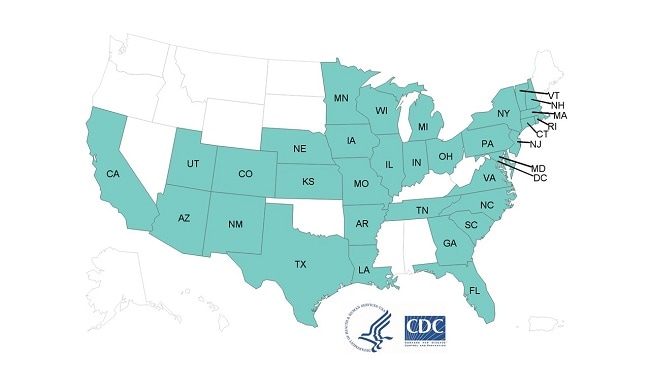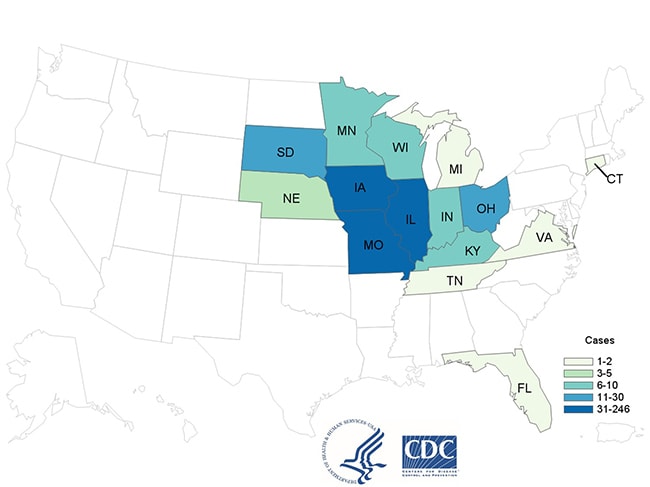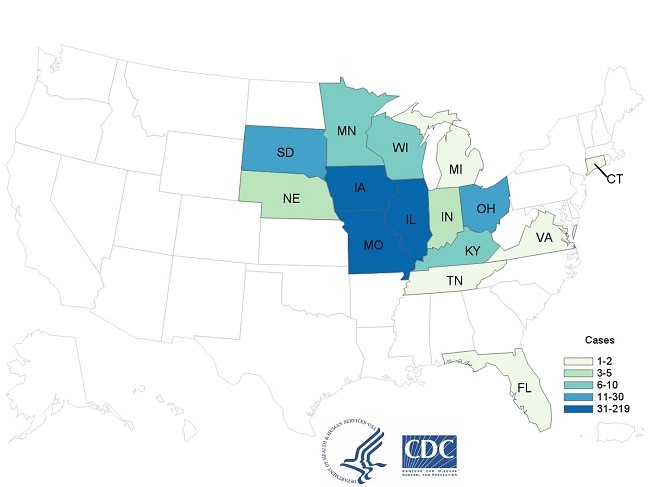Archive for the ‘Cyclospora’ Category
Cyclosporiasis — United States, May–August 2019
Monday, September 2nd, 2019
Geographic Distribution of Reported Cases of Domestically Acquired Cyclosporiasis—Since May 1, 2019*
- States reporting cases: 33
- Deaths: 0
- Hospitalizations: 92
CDC: 40 more cases in a Cyclospora outbreak linked to McDonald’s salads, pushing the illness total to 476.
Saturday, August 18th, 201857 Cyclospora cases have been reported in England, Scotland and Wales, of which 46 had travelled to Mexico.
Sunday, August 12th, 2018- The people who were infected stayed at several different hotels in the Cancun and Riviera Maya region
- The source is likely to be a foodstuff distributed to hotels in the area.

TO

Cyclosporiasis Outbreak: People who reportedly consumed salads from McDonald’s and were infected with Cyclospora as of August 9, 2018 (n=436)*.
Saturday, August 11th, 2018The Public Health Agency of Canada is collaborating with provincial public health partners, the Canadian Food Inspection Agency and Health Canada to investigate locally acquired Cyclospora infections in three provinces.
Thursday, August 17th, 2017August 11, 2017 – Update
This notice has been updated to include 26 additional cases of locally acquired Cyclospora that have been added to the outbreak investigation.

Why should you take note?
The Public Health Agency of Canada is collaborating with provincial public health partners, the Canadian Food Inspection Agency and Health Canada to investigate locally acquired Cyclospora infections in three provinces. The source of the outbreak has not been identified. Previous outbreaks in Canada and the United States (US) have been linked to imported fresh produce. The investigation is ongoing.
The risk to Canadians is low. Cyclospora is not found in water or food grown in Canada. The parasite is most common in some tropical and subtropical regions such as the Caribbean, South and Central America, South and South East Asia, the Middle East, and Africa. In Canada, non-travel-related illnesses due to Cyclospora occur more frequently in the spring and summer months. Illnesses among travellers can happen at any time of year. Cyclospora infections can be prevented by ensuring you are consuming fresh produce grown in countries where the parasite is not common, such as Canada, the US and European countries.
What is Cyclospora?
Cyclospora is a microscopic single-celled parasite that is passed in people’s feces. If it comes in contact with food or water, it can contaminate food and cause infection in the people who consume it. This causes an intestinal illness called cyclosporiasis. It is unlikely for Cyclospora to be passed from one person to another.
Investigation Summary
In Canada, a total of 130 cases have been reported in three provinces: British Columbia (13), Ontario (115) and Quebec (2). Individuals became sick between May and mid-July of this year. The majority of cases (53%) are male, with an average age of 47 years. The investigation into the source of the outbreak is ongoing. To date, no multi-jurisdictional outbreaks of Cyclospora have been linked to produce grown in Canada.
The outbreak investigation is active and the public health notice will be updated on a regular basis as the investigation evolves.
Who is most at risk?
People living or travelling in tropical or subtropical regions of the world who eat fresh produce or drink untreated water may be at increased risk for infection because the parasite is found in some of these regions.
Most people recover fully; however, it may take several weeks before an ill person’s intestinal problems completely disappear.
What should you do to protect your health?
It can be difficult to prevent cyclosporiasis. This is because washing produce does not always get rid of the Cyclospora parasite that causes the illness. You can reduce your risk by:
- cooking produce imported from countries where Cyclospora is found; and
- consuming fresh produce grown in countries where Cyclospora is not common, such as Canada, the United States and European countries.
When travelling to a region where Cyclospora is found,such as the Caribbean, South and Central America, South and South East Asia, the Middle East, and Africa, you can reduce your risk by:
- avoiding food that has been washed in local drinking water;
- drinking water from a safe source; and
- eating cooked food or fruit that you can peel yourself.
What are the symptoms?
People infected with Cyclospora can experience a wide range of symptoms. Some do not get sick at all, while others may experience more severe symptoms. Few people get seriously ill.
Most people develop the following symptoms within one week after being infected with Cyclospora:
- watery diarrhea
- abdominal bloating and gas
- fatigue (tiredness)
- stomach cramps
- loss of appetite
- weight loss
- mild fever
- nausea
When you eat or drink contaminated food or water, it may take 7 to 14 days for symptoms to appear. If left untreated, you may have the symptoms for a few days to a few months. Most people have symptoms for 6 to 7 weeks. Symptoms may go away and then return.
If you become ill, drink plenty of water or fluids to prevent dehydration from diarrhea. If you have signs of illness and have reason to believe you have cyclosporiasis, contact your health care provider who may request a laboratory test to confirm the illness. Antibiotics may be given to treat the illness.
What the Government of Canada is doing?
The Government of Canada is committed to food safety. The Public Health Agency of Canada leads human health investigations of outbreaks and is in regular contact with its federal, provincial and territorial partners to monitor and take collaborative steps to address outbreaks.
Health Canada provides food-related health risk assessments to determine whether the presence of a certain substance or microorganism poses a health risk to consumers.
The Canadian Food Inspection Agency (CFIA) conducts food safety investigations into the possible food source of an outbreak.
The Government of Canada will continue to update Canadians if new information related to this investigation becomes available.
Additional information
Media Contact
Public Health Agency of Canada
Media Relations
(613) 957-2983



